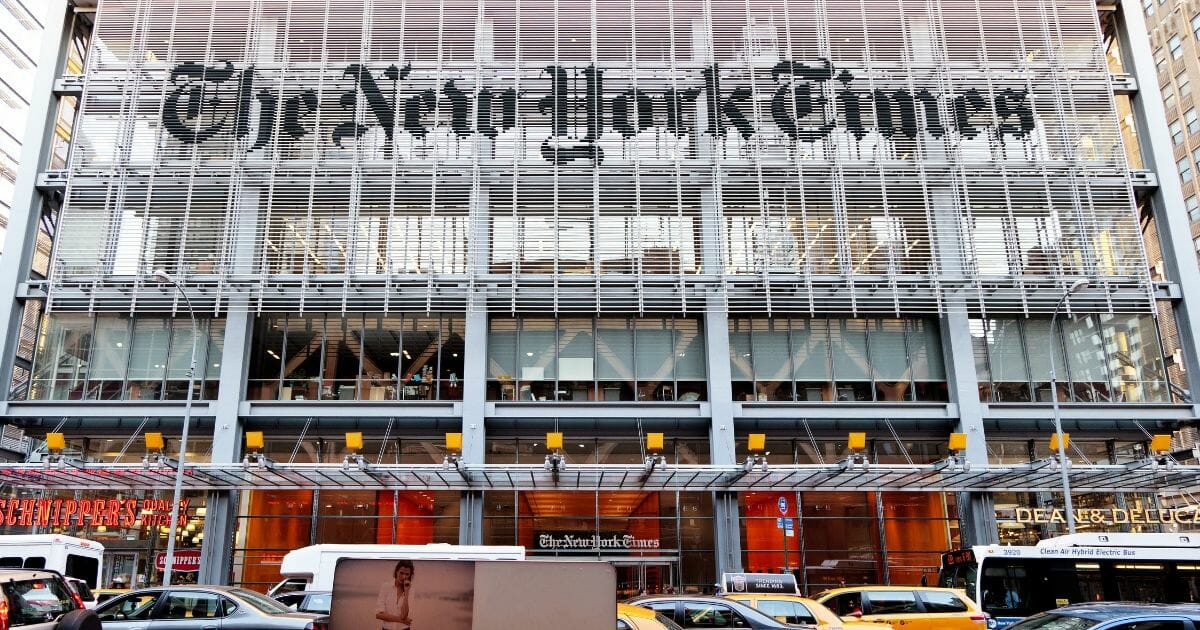
Marc Scaringi: The New York Times' 'America Is Racist' Project Is Based on a Lie
The New York Times “1619 Project” is being lauded by the media and many Democrats for what they believe is a long overdue discovery of the hidden truth of America — that it was founded on white racism and the enslavement of blacks and that even today the belief in white racial supremacy is so endemic to America that it’s a part of our national DNA.
The Project will likely be used to advance policies in Washington, D.C. and throughout the country that purport to remedy this alleged injustice. Democratic presidential candidate and U.S. Sen. Kamala Harris has already called the Project a “masterpiece.”
But is it?
First, it’s hard to take its claims seriously when its creators and contributors are privileged blacks holding exalted positions in journalism, the media and academia owned and controlled largely by whites. The Project’s creator, Nikole Hannah-Jones, is a black reporter employed by the white-owned New York Times. She holds a 2017 fellowship with the MacArthur Foundation, which was founded and endowed by a white man, where she received a $625,000 no-strings-attached grant. She’s doing pretty well as a black woman in what she claims is a white, racist America.
And, ironically, even though she condemns white America for its alleged systematic discrimination against blacks, she demanded that whites be excluded from the Project.
Second, Hannah-Jones had dedicated her career to writing about racial inequality. She had previously stated that whites are as racist today as our forefathers, but that we’ve adapted over time to cover our racism with a “sheen of deniability,” and that from Jamestown to today racial inequality is an intentional act by whites against blacks. So, Hannah-Jones came to this Project with a particular point of view. By reading her prior work, one can easily surmise the conclusion of the Project without reading a word.
Third, the major premise of the Project is based upon a lie. It claims America was birthed in slavery in 1619 when the first 20 African slaves disembarked at Jamestown. It claims America was not a nation, “conceived in liberty,” as Abraham Lincoln intoned, but instead a white, racist state begat through the original sin of slavery.
However, Jamestown was founded by a British company over a decade before the introduction of slaves; its purpose was to search for gold and establish trade to enrich its owners, not give freedom to anyone. America was born in 1776 when we declared our independence to free the American people, including blacks, from British rule.
Even the Project’s claim that the blacks at Jamestown were enslaved by whites is based upon a half-truth. It states, “The pirates had stolen [the slaves] from a Portuguese slave ship that had forcibly taken them from what is now the country of Angola.” But these Africans were likely captured and enslaved with considerable assistance from blacks.
In 1619, the Portuguese allied themselves with the Imbangala, a fierce African tribe that lived by marauding other villages and enslaving other Africans. The Portuguese used the Imbangala to attack, defeat and enslave the neighboring Ndongo tribe. The Portuguese then sold the enslaved Ndongo to the Americas.
The Project’s creator also writes about when the African slaves disembarked in Jamestown, “They were no longer Mbundu or Akan or Fulani. These men and women…Just a few months earlier, …[t]hey were free.” Yet, it’s highly unlikely that they had been free. The Mbundu were part of the Ndongo kingdom, which had a large slave population. About a third of the population of the Akan states were slaves or serfs. By the late 19th century, slaves still constituted about 50 percent of the Fulani Emirate. In African society, which was based upon the caste system, the upper castes did not sell their sons and daughters to the Portuguese, they sold their slaves.
Slavery was not introduced to “America” by whites at Jamestown. The Native American tribes here had a long history of enslaving each other and once blacks arrived, they enslaved them too. Some American blacks owned slaves. In some parts of the south, a greater percentage of free blacks owned slaves than whites. Only a small percentage of whites owned slaves. Slavery was not unique to America; it has existed throughout the world since before recorded history. In 1619, although slavery had been banned in Europe, it flourished in Africa.
Although America abolished slavery over 150 years ago, it still thrives in Africa. Africa has the highest rate of enslavement in the world with nearly 10 million enslaved today. There are more than three times as many people in forced servitude today as were captured and sold during the 350-year span of the transatlantic slave trade — the overwhelming majority is in Africa and almost none are in America.
The truth is America’s short-lived experience with slavery pales in comparison to that which has existed for millennia around the world and particularly in Africa. Slavery is “endemic” to Africa and is a part of its DNA — not America’s.
Contrary to what the 1619 Project would have you believe slavery and racism do not define what America was in 1619 or what it is today. America was born in freedom in 1776 for most and then born again with a new birth of freedom in 1865 for all.
After segregation was ended and the full panoply of civil rights ensured to all black Americans, America has fulfilled the promise of its original charter — that “all men are created equal, that they are endowed by their Creator with certain unalienable Rights, that among these are Life, Liberty and the pursuit of Happiness.” God Bless America!
The views expressed in this opinion article are those of their author and are not necessarily either shared or endorsed by the owners of this website. If you are interested in contributing an Op-Ed to The Western Journal, you can learn about our submission guidelines and process here.
Truth and Accuracy
We are committed to truth and accuracy in all of our journalism. Read our editorial standards.
Advertise with The Western Journal and reach millions of highly engaged readers, while supporting our work. Advertise Today.












